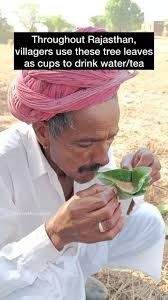
Vaidehi Bhargava
In Rajasthan, nature preservation is deeply ingrained in the daily lives of its people, and this is reflected in their unique practices to minimize environmental impact. One such inspiring example is the use of fallen leaves as eco-friendly cups for drinking chai (tea), instead of disposable paper or plastic cups. This practice not only conserves resources but also brings various medicinal benefits, making it a truly sustainable and health-conscious choice.
In villages across Rajasthan, people collect leaves from native trees like the banyan, peepal, sal, and banana trees to make cups. These leaves are chosen for their sturdy texture and are often stitched together to create a functional, biodegradable cup. Unlike single-use paper or plastic cups, which contribute to pollution and waste, leaf cups decompose naturally without harming the environment. Additionally, this practice reduces the demand for paper, thereby conserving trees and reducing deforestation. In a region with a semi-arid climate and limited water resources, such practices play a vital role in reducing waste and preserving the natural ecosystem.
Beyond their environmental benefits, leaf cups bring certain health advantages. Each type of leaf used offers unique medicinal properties. For instance, the leaves of the banyan tree are known for their anti-inflammatory properties and have been traditionally used in Ayurvedic medicine to aid in digestion and relieve stomach ailments. Peepal leaves are also considered beneficial for digestive health, believed to promote metabolism and improve gut health. Banana leaves, another common choice, contain polyphenols that act as antioxidants, which are thought to provide detoxifying effects. When hot tea is served in these leaf cups, the slight infusion of these natural compounds may offer added health benefits, making each sip a medicinal boost for digestion and overall well-being.
These trees—banyan, peepal, sal, and banana—grow in various regions of Rajasthan, especially in and around villages and forested areas. The banyan and peepal trees are considered sacred in Hindu culture and are often found near temples and community areas. They are widely revered, and their preservation aligns with traditional values of respecting nature. The banana tree, though more common in tropical areas, also grows in pockets of Rajasthan, particularly in areas with access to groundwater. The sal tree, primarily found in forest regions, has sturdy leaves that can be used for various purposes, including making plates and cups, due to their durability and thickness.
Using these fallen leaves for tea cups is more than a sustainable choice—it’s a practice that reflects the close relationship between the people of Rajasthan and their natural environment. By choosing biodegradable, medicinal leaf cups, villagers contribute to a cleaner environment while preserving their cultural heritage and promoting wellness. This practice highlights a deep-seated respect for nature and emphasizes the importance of simple, eco-conscious actions in daily life.
In a world where disposable culture has led to increasing pollution and waste, Rajasthan’s leaf cup tradition serves as a reminder of how time-honored practices can have modern relevance, offering solutions that are not only sustainable but beneficial for health and well-being.

